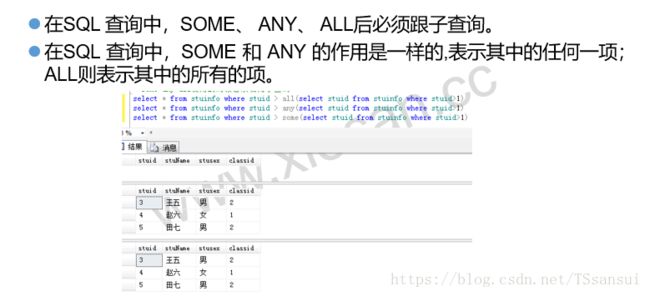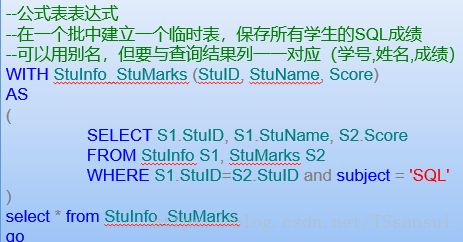SQL Server数据库开发(3.SQL高级查询)
一,嵌套子查询
降低SQL语句的复杂度,提高SQL语句的可读性
--子查询作为条件 (where)
--查询王五前面的同学
select * from StuInfo where stuid < (select stuid from StuInfo where stuName = '王五')
go
--子查询作为临时表 (from)
--查询李四成绩大于80分(StuInfo作为子查询)
select stuName,subject,score from StuMarks s1,
(select * from StuInfo where stuName = '李四') s2
where s1.stuid = s2.stuid and score > 80
go
--(StuMarks作为子查询)
select stuName,subject,score from StuInfo s1,
(select * from StuMarks where score > 80) s2
where s1.stuid = s2.stuid and stuName = '李四'
--子查询作为列 (select)
select s.*,
(select score from StuMarks where subject = 'HTML' and s.stuid = StuMarks.stuid) as '成绩'
from StuInfo s
-in 在...范围之内 not in 不在...范围之内 (意思一样,可以包含多个值,中间用逗号隔开)
![]()
--查询学好为123的学生信息
select * from StuInfo where stuid in (1,2,3)
--查询Java成绩在80以上的同学
select * from StuMarks where subject = 'JAVA' and score >80
select stuName from StuInfo s1,(select * from StuMarks where subject = 'JAVA' and score >80) s2
where s1.stuid=s2.stuid
--in方法去写
select stuName from StuInfo where stuid in(select stuid from StuMarks where subject = 'JAVA' and score >80)
--查询所以平均成绩大于80分
select AVG(score) from StuMarks group by stuid having AVG(score)>80
select * from StuInfo where stuid in (select AVG(score) from StuMarks group by stuid having AVG(score)>80)
--exists not exists (是否存在)
select * from StuInfo where exists
(select * from StuMarks where StuInfo.stuid=StuMarks.stuid)
SOME、 ANY、 ALL后必须跟子查询
--SOME 和 ANY 的作用是一样的,表示其中的任何一项
select * from StuInfo where stuid > any(select stuid from StuInfo where stuid>1)
select * from StuInfo where stuid > some(select stuid from StuInfo where stuid>1)
--all表示其中的所有的项
select * from StuInfo where stuid > all(select stuid from StuInfo where stuid>1)
二,聚合技术
--compute by
select StuInfo.stuid,stuName,stusex,[subject],score from StuInfo,StuMarks where StuInfo.stuid = StuMarks.stuid order by StuInfo.stuid
compute max(score),min(score),avg(score) by stuid
三,排序函数
ROW_NUMBER根据排序语句,递增排序
select ROW_NUMBER()over(order by AVG(score) desc ) as '名次',stuid,AVG(score) from StuMarks GROUP BY stuid
--rank根据排序语句,但是存在并列,跳空
select rank()over(order by AVG(score) desc ) as '名次',stuid,AVG(score) from StuMarks GROUP BY stuid
--dense_rank根据排序语句,但是存在并列,不跳空
select dense_rank()over(order by AVG(score) desc ) as '名次',stuid,AVG(score) from StuMarks GROUP BY stuid
--partition by分组列
select DENSE_RANK() over(partition by subject order by score desc)as'排名',StuInfo.stuid,stuName,[subject] from StuInfo,StuMarks where StuInfo.stuid=StuMarks.stuid
select DENSE_RANK() over(partition by subject order by score desc)as'排名',[subject],score from StuInfo,StuMarks where StuInfo.stuid = StuMarks.stuid
四,公示表表达式
with sumscore(学号,总成绩)
as
(
select stuid,SUM(score)
from StuMarks
group by stuid
)
select * from sumscore
with sscore(学号,姓名,总成绩)
as
(
select StuInfo.stuid,stuname,SUM(score)
from StuMarks,StuInfo
where StuInfo.stuid=StuMarks.stuid
group by StuInfo.stuid,stuname
)
select * from sscore






